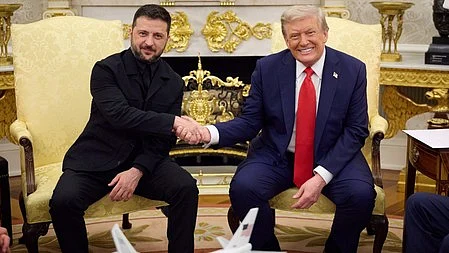Zelenskyy backs Trump, calls tariff on India ‘the right idea’
The Ukrainian president’s remarks came in response to Prime Minister Modi’s high-profile visit to China for the SCO summit

Ukrainian president Volodymyr Zelenskyy has voiced support for Donald Trump’s tariffs on nations like India that are providing economic support to Russia, even as New Delhi claims it is ramping up its diplomatic efforts to help bring an end to the devastating war in Ukraine.
“I think the idea to put tariffs on the countries continuing to make deals with Russia is the right idea,” Zelenskyy told ABC News, amid growing international pressure on nations engaging with Moscow, including India for its purchases of Russian crude oil.
His remarks came amid Prime Minister Narendra Modi’s high-profile visit to China for the Shanghai Cooperation Organisation (SCO) summit, where he met with both Chinese and Russian leaders, navigating the complex currents of global diplomacy.
Zelenskyy’s statement coincides with the Trump administration’s plans to broaden sanctions against Russia, following a summit between POTUS Donald Trump and Russian president Vladimir Putin in Alaska in August, which yielded little in the way of diplomatic breakthroughs.
On 7 September, Sunday, Trump indicated his readiness to escalate punitive measures, with National Economic Council director Kevin Hassett pointing to India’s continued purchase of Russian oil as a potential target.
Meanwhile, in a post on X, Zelenskyy spoke of Russia’s latest attacks on Ukrainian soil, saying, “This is a clear sign that Putin is testing the world.”
“At the National Economic Council, we are responsible for ensuring sanctions are enforced, and that those aiding Russia in its war against Ukraine — for instance, through oil purchases — are held accountable economically,” Hassett said, also following the latest Russian military strikes.
“There will be much discussion about the level and timing of these sanctions in the coming days.”
Prime Minister Modi — who has tried to balance diplomacy with Ukraine and Russia, China and the US simultaneously over the years — was last in Kyiv on 23 August 2024, a trip hailed as historic, being the first from an Indian head of state since Ukraine’s independence in 1991. But can India, in the circumstances, honour its commitment to fostering peace while maintaining its strategic balance and safeguarding its own economic imperatives?
For a lot of the impact of that Ukraine trip was undone by India’s continued sourcing of crude oil and the PM’s subsequent meetings with President Putin internally — not least the trip to Russia in October 2024, his second trip that year. That visit focused on strengthening strategic and bilateral ties with Moscow, spanning trade, energy and regional cooperation — which, together with meetings on the BRICS sidelines, can’t have sat well with Zelenskyy.
Earlier this September, Modi’s high-level discussions with European Commission president Ursula von der Leyen, European Council chief Antonio Costa and French president Emmanuel Macron also included the Russia–Ukraine situation — and Europe does not sound happy with India either, though not offering Trumpian tariffs yet.
Meanwhile, external affairs minister S. Jaishankar spoke with his Ukrainian counterpart, Andrii Sybiha, reaffirming India’s steadfast support for a swift resolution to the conflict and the establishment of enduring peace. He has also in the past highlighted that India is far from being the highest buyer of Russian crude — which seems to be the popular narrative among the international public, as a result of its repeated invocation in the tariff war.
However, the dance of diplomacy is getting to be a challenging one for India, and the Modi government must exercise caution in continuing to project India as a responsible global actor, balancing historic alliances with proactive efforts to nurture peace in a turbulent world.
Also Read: The perils of foreign policy neutrality
Follow us on: Facebook, Twitter, Google News, Instagram
Join our official telegram channel (@nationalherald) and stay updated with the latest headlines
